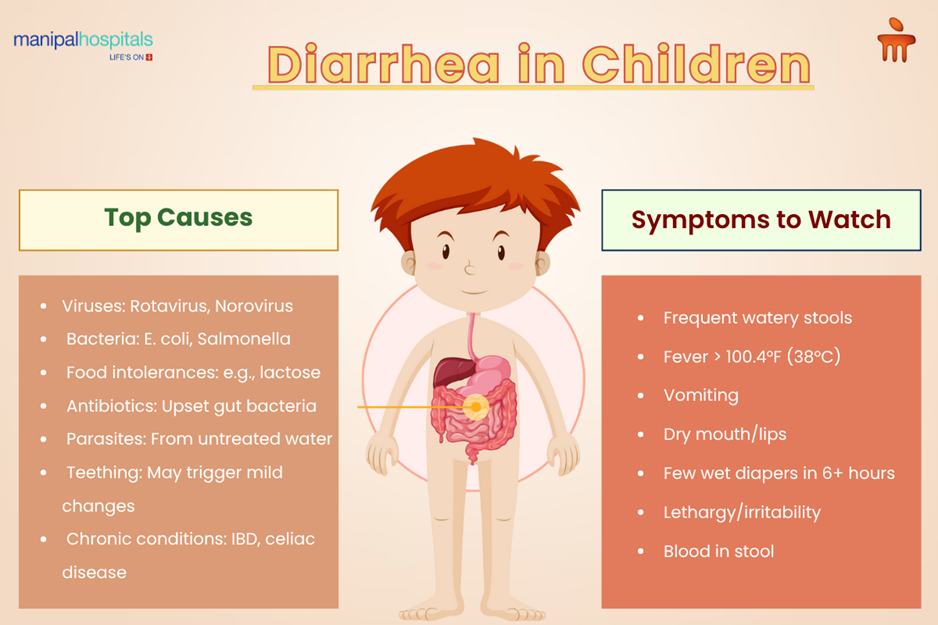
When young children have diarrhoea, their stools become watery and loose, occurring frequently throughout the day. Diarrhoea is common in children, though it is usually not a serious concern for their health. The health risk increases when the condition lasts for several days or leads to dehydration. Those caring for children should monitor 3 key signs of dehydration: dry mouth, absence of tears when crying, and infrequent wet diapers. This blog will explore diarrhoea in children: causes, symptoms, and safe treatment options.
Synopsis
Understanding Diarrhea in Children
More than one factor can lead to diarrhoea in children, while most cases resolve quickly. Awareness of the potential causes of loose motion helps parents take prompt action to minimise further complications.
Several points exist about child diarrhoea as follows:
-
Diarrhea is Common in Toddlers. In children under 5 years old, their developing immune systems remain more vulnerable.
-
Highly Contagious. Infections that cause loose motion spread quickly through contaminated hands, toys, and food.
-
Often Self-Limiting. Antibiotic treatment is rarely necessary for this condition, as it typically resolves when kids stay hydrated and eat simple, easy-to-digest foods.
Common Causes of Diarrhea in Children
Identifying the underlying cause of diarrhoea helps select the proper treatment and prevent future occurrences. While some causes are often overlooked, doctors must consider other potential sources of the problem. Here are the most common causes of diarrhoea in children:
-
Viral Infections: Rotavirus and norovirus both function as viral causes of diarrhoea, producing symptoms of diarrhoea with vomiting and fever.
-
Bacterial Infections: Bacteria like E. coli, Salmonella, or Campylobacter can cause severe diarrhoea, especially after eating contaminated food or water.
-
Food Intolerances: Some children cannot digest certain foods, such as lactose (milk sugar), which can lead to loose stools and stomach cramps.
-
Antibiotic Use: Taking antibiotics can sometimes upset the balance of good bacteria in the gut, causing diarrhoea as a side effect.
-
Parasites: Drinking untreated water or poor hygiene can lead to infections like Giardiasis, which causes watery stool and stomach pain.
-
Teething: Though not a direct cause, teething can sometimes lead to changes in digestion and mild diarrhoea.
-
Underlying Conditions: Conditions like inflammatory bowel disease (IBD) or coeliac disease can cause persistent or recurring diarrhoea.

Symptoms to Watch Out For
Not all diarrhoea needs medical care, but some signs show your child may need a doctor. Knowing what to watch for can help prevent complications and ease your child’s discomfort faster. Here are the top symptoms to look for in diarrhoea in children:
-
Frequent Watery Stools: More than three watery stools in a day may indicate diarrhoea that requires monitoring.
-
Fever: A temperature above 100.4°F (38°C) with diarrhoea could indicate an infection.
-
Vomiting: Diarrhoea accompanied by vomiting increases the risk of dehydration and may require urgent medical care.
-
Dry Mouth and Lips: Signs such as dry mouth or lack of saliva can indicate your child is dehydrated.
-
Few Wet Nappies: If your child urinates less than usual, especially over 6 hours, it’s a warning sign of dehydration.
-
Lethargy or Irritability: If your child is too tired, not alert, or unusually fussy, seek medical help quickly.
-
Blood in Stool: This is abnormal and may suggest a severe infection or problem needing attention.
Child Diarrhea Treatment Options
Treatment depends on the underlying cause of the diarrhoea. Many children recover with basic care at home, but some may require medical attention or specific medications. The main goal is to keep your child well-hydrated and comfortable. Here are the most common child diarrhoea treatment options:
-
Oral Rehydration Solutions (ORS): Special drinks like ORS help replace lost fluids and minerals and are safer than sugary juices or sodas.
-
Continue Breastfeeding: For infants, breastfeeding should continue, as it gives comfort, hydration, and immunity support.
-
Light, Easy-to-Digest Foods: Offer bananas, rice, toast, applesauce, and yoghurt to help firm up the stool and soothe the stomach.
-
Avoid Dairy (If Needed): Dairy can make diarrhoea worse in some cases, especially if your child is lactose intolerant.
-
Probiotics: These good bacteria can help restore gut balance and shorten the duration of diarrhoea.
-
Avoid Anti-diarrhoea Medicines: Unless your doctor says so, these medications are not recommended for young children, as they may cause side effects.
-
Medical Help for Persistent Cases: If diarrhoea lasts a few days, your doctor may test for infections or underlying conditions and prescribe treatment.
Conclusion
Diarrhoea in children is usually not severe if treated early and managed properly at home. Infections cause most cases and resolve within a few days. However, watching for signs of dehydration or any unusual symptoms is essential. Use ORS, give your child rest, and avoid heavy or spicy foods. If loose motion continues for too long or your child seems unwell, consult an experienced paediatrician in Bangalore. Staying calm and informed is the best way to support your child’s health and comfort.
FAQ's
Most diarrhoea cases last 2 to 3 days, but some can last up to a week, mainly if caused by a virus. When it persists, it may signal an underlying GI infection, so visiting a paediatrician in Bangalore is important to get the best course of treatment.
To avoid loose stools, avoid greasy, fried, or spicy foods and fruit juices. Stick to bland foods like bananas, rice, and toast until your stomach is better.
Teething can lead to drooling and changes in eating, which sometimes may trigger loose stools, but it is not a direct cause.
Yes, plain yogurt contains probiotics that can help restore healthy gut bacteria and may relieve symptoms of diarrhea.
Call a paediatrician if you notice blood in your child’s stool or he or she has a high fever, signs of dehydration, or diarrhea that has lasted more than three days. All these issues warrant immediate care because the root cause is often an underlying issue related to the gut.





















 5 Min Read
5 Min Read














